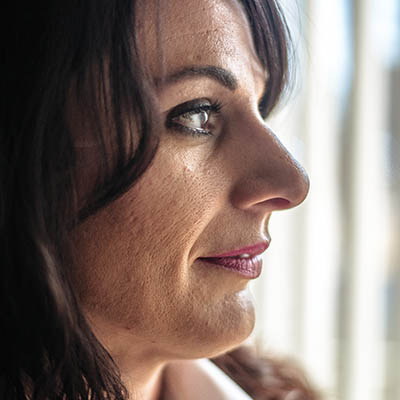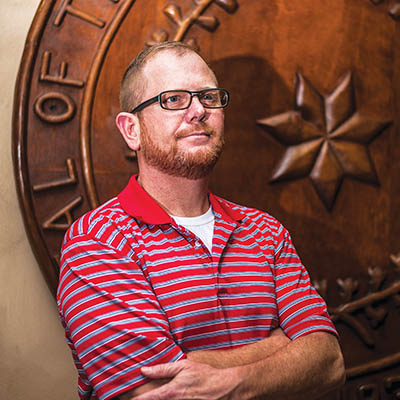Holistic rehabilitation
Tribal programs help Native American ex-inmates reintegrate after prison
Leslie Deere plays with her grandchildren at her daughter’s home in Seminole. Deere was a participant in the Muscogee (Creek) Nation’s Reintegration Program and recently enrolled in a course to become a truck driver.
Joseph Rushmore
Leslie Deere has been in and out of Oklahoma prisons twice since 2009, serving time for various drug-related offenses. After 13 years of dealing meth, the 43-year-old said she’s ready and willing to turn her life around.
Thanks to her Native American tribe, she may have a real shot to achieve that goal.
The Muscogee (Creek) Nation, in an effort to help former prisoners re-enter society, offers a reintegration program that provides money for food, new clothes, housing, and help with court costs and fines for tribal members who served time in prison during the last four years.
“There were services available, but it seemed like every time you turned around people with a felony record were denied services,” Director Tony Fish said of the program’s start in 2005. “So instead of letting our citizens fall through the cracks, we created a program that would help them.”
This requires a focus on rehabilitating the participants in a holistic manner, he said.
“We create opportunities for healing. You may not be able to go and undo the crime you committed, but you can try to make amends.”
During 2017, Native American inmates made up 11.3 percent of the Oklahoma Department of Corrections population, increasing since 2013, when the rate stood at 9.8 percent. (Both numbers are higher than the overall percentage of American Indians in Oklahoma’s general population, which stands at 9.2 percent).
Like all convicted felons, American Indians face several challenges when they are released, namely with housing and work opportunities. The MCN Reintegration Program helps tribal members overcome those barriers.
The program first focuses on life-sustaining needs, including clothing, groceries, housing, and medical necessities. A lawyer on staff helps participants work with the justice system regarding court payments and fines, said Sprint Williams, senior case manager.
And a new multimillion-dollar sober living facility located next to the reintegration offices, funded partially with a grant from the U.S. Department of Justice, offers up to 36 participants a safe and comfortable place to live for up to approximately nine months.
“Without shelter, you’re homeless, basically,” Fish said. “There’s no place to lay your head at night. It’s dangerous.”
People stay in the program for various lengths of time, depending on their needs.
“For instance, we might have somebody who’s been in prison 25 years whose needs are way different from someone who’s been in prison for six months.”
Typically, participants take four to six months to complete the program, though some have been in the program for as long as a year and a half.
Since 2005, 600 people have completed the re-entry program, which is only available for people with felonies, Fish said. There are currently four case managers and a staff of around 22.
For many men, the immediate focus after being released is on money and making enough of it to cover the fines and court fees, Williams said.
Without proper support, he said, they will just return to what they know—hustling—while women often work to return to their children. In one instance, a man who received a 75-year sentence but was able to reduce his term to 17 years enrolled in the tribal reintegration program upon his release. While in prison, he received his general contractor license for plumbing and returned to his wife and kids. He now works as part of the plumbing crew at the tribe’s housing authority.
“He runs the show up there when it comes to plumbing,” Fish said.
According to Department of Corrections data, the overall three-year recidivism rate for Native Americans during fiscal year 2017 was 30 percent. For those in the Muscogee (Creek) Nation program, the rate was 10 percent.
For Deere, the opportunity to reconnect with her children and grandchildren has been invaluable. She recently enrolled in a course to become a truck driver.
“I want to change my life. I want to do better, and this is a good program. They help me out a lot,” she said.
 The Cherokee Nation has a similar program, which helped Kalli Watkins re-enter society following a prison stint for drug-related crimes.
The Cherokee Nation has a similar program, which helped Kalli Watkins re-enter society following a prison stint for drug-related crimes.
Watkins left prison on Sept. 9, 2015, and met Daryl Legg, who runs the Cherokee Nation’s Coming Home program, which helps former prisoners get back on their feet.
Legg, a three-time prisoner in Arkansas and Oklahoma, turned his life around and started working for the Nation as a vocational rehab counselor. He moved around in Career Services and got promoted to director of vocational programs.
“Our re-entry program is a one-chance opportunity,” he said. “We don’t invest millions and millions where people can just reoffend and come back anytime they want. They really are coached to take advantage of the opportunities they have.”
For Watkins, that meant a chance to return to the working world, which she said was one of the most crucial elements to re-entering society.
Watkins had previously worked at the City of Tulsa as an administrator of budget and capital planning. A second DUI after she “went wild” following a divorce earned her a felony conviction. She ended up in drug court, where she met a man who was a drug user.
“I always despised it, but at 33, I decided to start doing drugs,” she said. “And in two short years, I destroyed my life. It didn’t take long.”
She ended up with several possession charges in different counties. She was serving a 10-year sentence out of Rogers County when she was able to join a Department of Corrections program that allowed her to do six to nine months. But, being the hardheaded woman she is, she said, she quit, which turned her months-long sentence into three years.
“But I think it had to happen,” Watkins said. “That time period—that six to nine months—I still felt like it didn’t hurt me. This doesn’t feel bad. I was just going to get out and do the same thing.”
 Once Watkins was released, Legg was the first person she called. They met at the Hard Rock Casino for a job fair, but Legg ultimately hired her for the Coming Home program. She works as a career specialist for the tribe, assisting with re-entry applications, finding employers who will hire felons, and working on economic development issues.
Once Watkins was released, Legg was the first person she called. They met at the Hard Rock Casino for a job fair, but Legg ultimately hired her for the Coming Home program. She works as a career specialist for the tribe, assisting with re-entry applications, finding employers who will hire felons, and working on economic development issues.
“I think jobs are the single most important thing that people coming out of prison need,” she said. “For one, just having too much time on your hands is obviously no good. It’s going to lead you back to the wrong place and stressing out about money and finances—if you can’t find a way to support yourself, then you’ll find a way to support yourself. For me, I think it was the single most important piece of my release.”
To that end, the Cherokee Nation program provides $250 worth of new clothes for job interviews, hygiene items, and help reinstating licenses.
Next, program participants focus on finding a job. While in prison some are trained in welding, plumbing, and other skill areas. Once released, they go to interviews. Participants who are successful at finding a job earn anywhere from $9.50 to $26 per hour, said Legg, who received a pardon from Oklahoma Governor Mary Fallin in 2017 and is awaiting a pardon from Arkansas Governor Asa Hutchinson.
“It gives them a real big second chance,” Legg said of Coming Home. “Just getting released is one thing, but getting released and being able to have clothes to go to an interview in, having clothes to be able to walk out on a construction site and just start working, then having your driver’s license back and not having to worry about fees and how am I going to get this. We remove barriers for folks to become employed.”
The program has a 10.8 percent recidivism rate. For Watkins, 38, the chance to work in a new field has been life-altering, she said.
“My life is better than it has ever been, probably,” she said. “In accounting, I never thought I was a people person or had the opportunity to help other people, and now I love this job. And I think helping people helps me stay better.”


.jpg)
.jpg)
